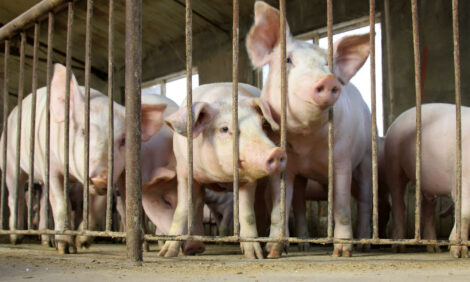



Supermarkets Questioned Over Pig Sector Squeeze
UK - With Scottish pig farmers being told of plans to cut both farmgate prices and the numbers of pigs processed in Scotland, NFUS has expressed its grave concerns about the future of the Scottish pig industry.
This comes despite a year that saw a major increase in consumer demand for pork in Scotland, with a 3% increase in sales values and a 4% increase in volumes. Furthermore, Scottish consumers are prepared to pay more for pork produced to high standards, paying an average of 34.51/kg, suggesting that they favour quality assured pork over cheaper imports. English consumers pay only 34.20/kg on average.
NFUS has described this price pressure as completely unacceptable and has questioned the retailers’ commitment to high quality British pork and their commitment to high animal welfare standards. Since a ban on the use of stalls and tethers was introduced in the UK on animal welfare grounds, to provide pigs with better living conditions, supermarket imports from countries still using this production system have soared (see notes for details).
Scotland only has one major pigs processing facility, owned by Grampian Country Food Group, at Broxburn, near Edinburgh. The plant was subject to a 316 million investment last year, at the same time as the Group’s other plant at Buckie in Aberdeenshire closed.
NFUS President John Kinnaird said:
“This situation is completely unacceptable. The Scottish pig industry has led the way on efficiency and high standards of production, only to find their efforts undermined by cheap imports.
“There are two critical questions I will be asking the major supermarkets. Are they committed to farm-assured pork and the high standards of production associated with it? If so, why have imports increased from countries operating to lower standards? I will be telling them in no uncertain terms that this latest downward pressure could squeeze the life out of the Scottish industry and deprive their customers of quality and choice.
“We appear to have a bizarre situation where Scottish consumers are prepared to pay 7% more for their pork compared to England, in increasing quantities, and yet the Scottish producers of that pork receive less than their English counterparts and are facing further downward pressure.
“We only have one processing plant left at Broxburn, which was subject to significant reinvestment just a few months ago, with financial assistance from the Scottish Executive. I have had discussions with the company and plan to meet them again. We must work together to secure a sustainable return for the whole supply chain which secures a future for the Broxburn plant and, crucially, for the whole Scottish pigs industry.“
Robin Traquair, Chairman of the NFUS Pigs Committee said:
“The supermarkets tell us they are committed to the Scottish industry, but the raw figures are telling a completely different story. Scottish pig farmers are being punished for doing exactly what consumers and supermarkets have asked us to do; produce to the highest standards. Rather than reward the industry for this, it appears the supermarkets are chasing cheap imports, irrespective of their quality and animal welfare credentials.“
NOTES
- In the mid-90s, before the ban on the use of stalls and tethers took effect, the UK industry accounted for 90 per cent of the UK pork market. Market share is now just over 60 per cent.
- The UK used to be a net exporter of pork throughout the 80s and 90s. From 2000, the UK has been a net importer of pork. In 2005, the UK imported 422,000 tonnes, compared to an export trade of only 91,000 tonnes. This was a further 10 per cent increase in pork imports from 2004.
- The current farmgate price of pigs is around 97p/kg deadweight. The break-even price is around 100p/kg.







